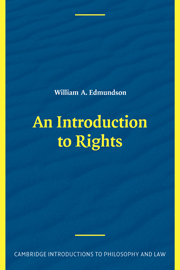Book contents
- Frontmatter
- Contents
- List of Tables
- Preface
- Part One The First Expansionary Era
- Part Two The Second Expansionary Era
- 6 The Universal Declaration, and a Revolt Against Utilitarianism
- 7 The Nature of Rights: “Choice” Theory and “Interest” Theory
- 8 A Right to Do Wrong? Two Conceptions of Moral Rights
- 9 The Pressure of Consequentialism
- 10 What Is Interference
- 11 The Future of Rights
- 12 Conclusion
- Bibliographical Notes
- References
- Index
9 - The Pressure of Consequentialism
Published online by Cambridge University Press: 08 January 2010
- Frontmatter
- Contents
- List of Tables
- Preface
- Part One The First Expansionary Era
- Part Two The Second Expansionary Era
- 6 The Universal Declaration, and a Revolt Against Utilitarianism
- 7 The Nature of Rights: “Choice” Theory and “Interest” Theory
- 8 A Right to Do Wrong? Two Conceptions of Moral Rights
- 9 The Pressure of Consequentialism
- 10 What Is Interference
- 11 The Future of Rights
- 12 Conclusion
- Bibliographical Notes
- References
- Index
Summary
We have examined Hohfeld's classification of “legal advantages” and transposed his work from the realm of legal to that of moral rights. We have seen that Hohfeldian elements can be combined in various ways, yielding various conceptions of a moral right. In particular, we distinguished the protected-choice and protected-permission conceptions. A moral right, according to the protected-choice model, is simply a moral claim-right against interference by others with the right-holder's performing (or failing to perform) some type of act. That type of act may or may not be one that it would be wrongful for the actor to perform; in other words, the protected-choice model depicts a right to do (what may be) wrong. In contrast, the protected-permission model combines the basic claim-right against interference with a moral option to perform the specified act – a moral option being a combination of a Hohfeldian moral permission to perform the act and a Hohfeldian moral permission not to perform the act. There is no right to do wrong, on the protected-permission model; what is protected on this model is the actor's moral right to choose whether to do or not to do something that is neither morally required nor morally forbidden for him to do.
We have also considered Choice Theories of rights. As a theory about the conceptual makeup of moral rights, Choice Theory insists that any molecule of Hohfeldian elements purporting to constitute a moral right must include an additional element – namely, a bilateral moral power to waive or enforce the core claim-right against interference.
- Type
- Chapter
- Information
- An Introduction to Rights , pp. 143 - 160Publisher: Cambridge University PressPrint publication year: 2004



